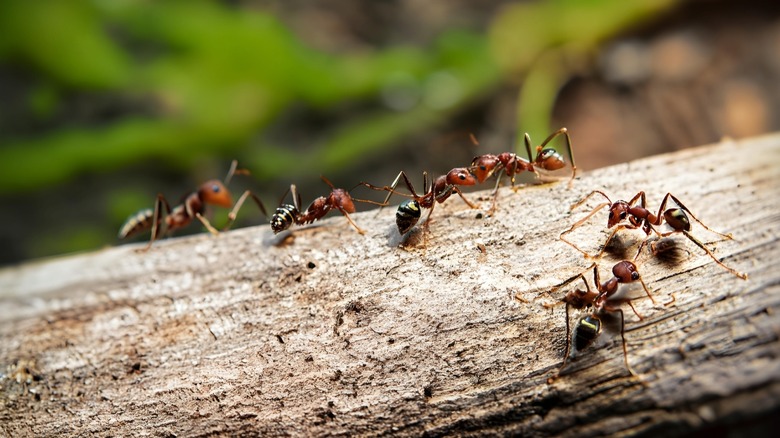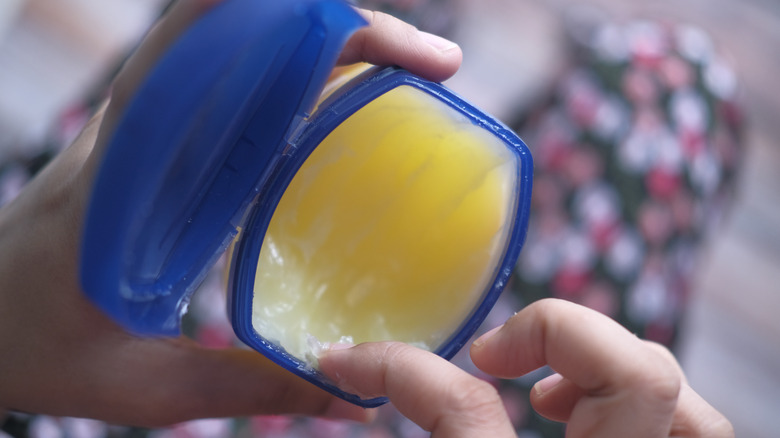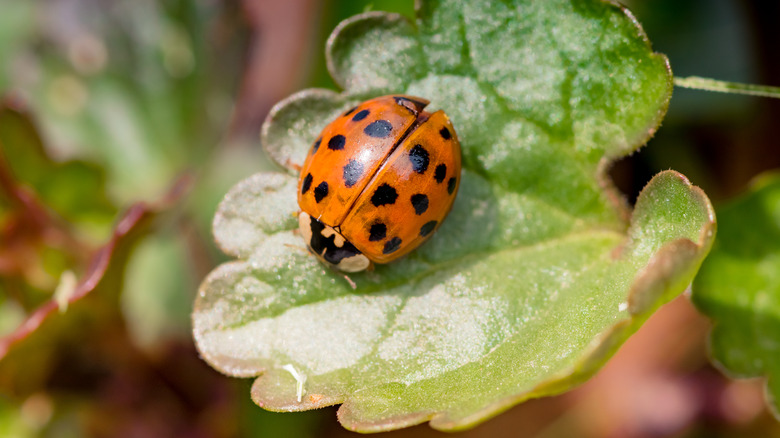The Vaseline Hack That Keeps Pests Off Of Plants & Tree Trunks (& Should You Try It?)
If you notice that a particular tree or plant is constantly being visited by pests like ants, caterpillars, or other crawling insects, then you might be searching for a remedy on how to stop them. Rather than spraying harmful chemicals like pesticides into your garden, there are more homeopathic remedies that you can first utilize before going that route. For example, plenty of gardeners recommend using petroleum jelly on the base of a tree or plant to stop these insects from climbing up. While it seems like a handy way to use Vaseline around the house, it's tricky to discern if it's actually worth the time and effort. That's why we reached out to an expert to weigh in on whether or not the Vaseline gardening hack works. And according to Charles van Rees, Ph.D., a conservation scientist and naturalist, it does to a certain extent — but there are some major caveats.
"Petroleum jelly can certainly help keep crawling insects from climbing up the trunk of a tree and reaching the foliage. An additional advantage is that it can be relatively inexpensive," he exclusively tells House Digest. "However, flying insects will be able to bypass it readily." There are pros and cons to every gardening hack you try, so whether or not this hack works for you depends on what type of pests you're trying to discourage. Here is a deeper look into the pros and cons of using Vaseline as a pest deterrent on your plants.
Using Vaseline on your trees and plants might not be worth trying
If you're looking to naturally repel pests from your garden, you might be considering using Vaseline. This hack can be beneficial if you're battling with an insect that exclusively crawls and doesn't fly. When asked what kind of pests this hack can deter, van Rees exclusively tells House Digest, "Ants are the major ones that come to mind, but potentially also nymph (juvenile) grasshoppers." However, he stresses that most adult insects can fly, so they can access parts of a tree by bypassing the petroleum jelly.
There are also a lot of drawbacks to consider. The first is that the thick substance might harm the plant. "There could be risks to the tree itself, as the jelly will impede gas exchange ('breathing') of tissues along the trunk via the bark, or could otherwise affect the health of the bark," van Rees exclusively tells House Digest. He mentions that he has seen gardeners claim on gardening forums that their fruit trees died after trying this hack, and it could be due to the application of the foreign substance. Secondly, Vaseline is technically a pollutant. "Petroleum jelly, like motor oil, is an environmental pollutant which is hard to break down and which can have negative impacts on the surrounding ecosystem," he shares. It can linger in the ground for years to come.
What to do instead
Instead of using Vaseline, van Rees recommends finding another solution based on your particular situation. It all depends on what kind of pest you're battling and what kind of plant you're trying to save. However, one option he recommends is an eco-friendly barrier. "Physical barriers like netting are often less expensive and less environmentally harmful than the application of pesticide chemicals," he told House Digest in an exclusive interview.
He also mentions that using biological pest control like releasing predatory insects is another healthy alternative, but you don't want to get overzealous with it. "Many people over-enthusiastically release ladybugs and praying mantises into their gardens as pest control, without realizing that those particular species might not be native to their region," van Rees warns. "This can negatively affect native species, many of which are more effective at controlling pest populations." To do this safely, it's best to instead plant native plants that attract these predatory insects, so they will come to your yard naturally. If you're unsure which ones to plant, he suggests looking at native plant forums or reaching out to your local agricultural extension agents for guidance.


